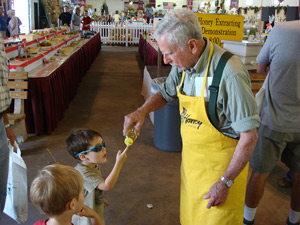 |
Catch Bee Fever!
Beekeeping is a fantastic hobby. Those who get into beekeeping often get what is called “bee fever.” This is a hobby with many facets and gives almost anyone an opportunity to learn more about nature and the role of the productive honey bee, and we would like to share it with you.
In addition to BUMBA's Short Course on Bee Biology and Beekeeping Basics each Spring, our members give beekeeping presentations and volunteer many times during the year. Our goal? To get the word out to our community about the wonder and importance of honeybees. It doesn't hurt that local honey tastes great, as well!
The slideshow at right shows BUMBA talks and demonstrations each year at UMD's Maryland Day, MNPPC's A-May-Zing Animal Festival, the Maryland State Beekeepers Honey Festival, and individual presentations at schools, parks, churches, clubs, youth gardens and many other gatherings.
Email us at outreach@bumbabees.com if you want to arrange for a beekeeper presentation!
Upcoming Events(click here for complete list!)
- April 14: Bowie Lion's Club-Bowie Green Expo: Kenhill Center, 2614 Kenhill Drive, Bowie, BowieGreenExpo.org
- April 14: Short Course Apiary Field Day and Hands-On Soap and Candle Making
- April 28: Maryland Day at the University of Maryland-College Park, bee demo on Ag Day Avenue
- May 5: Spring Farm Festival, Hard Bargain Farm, 2001 Bryan Point Rd, Accokeek, FergusonFoundation.org/sff.shtml
- May 19: A-MAY-Zing Animal Fest, Bladensburg Waterfront Park, 4601 Annapolis Rd, PGParks.com/page42117.aspx
- May 19: Mount Rainier Day Route 1, Mount Rainier, MountRainierMd.org
Fascinating Bee Facts We Are Ready to Share:
- It takes 5 to 8 pounds of nectar to make a pound of honey.
- It takes 8 to 10 pounds of honey to make a pound of beeswax.
- If you do the math, that means it takes 40 to 80 pounds of nectar to make one pound of beeswax!
- To produce a pound of honey, bees travel about 55,000 miles and visit about 2 million flowers.
- Each bee produces on average 1/12 of a teaspoon of honey in its short and industrious life.
- The Queen bee lays up to 3,000 eggs a day (sometimes more).
- Honey bees are dying by the millions in the U.S. If you think that doesn’t affect you, think about what your diet would be like without apples, cherries, plums, pears, berries, pumpkins and other fresh fruit and vegetables – not to mention honey.
- Local support for beekeeping is critical to earn support for research that will keep the honeybees flying for future generations.
